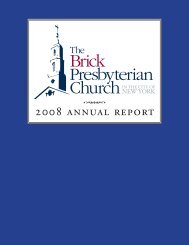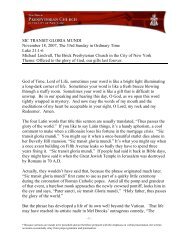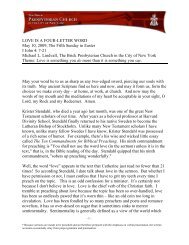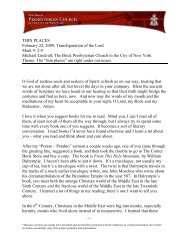You also want an ePaper? Increase the reach of your titles
YUMPU automatically turns print PDFs into web optimized ePapers that Google loves.
2 THE RECORD september 2012<br />
fROm THE pasTOR<br />
By Doug King<br />
In September, many churches across the country have what is<br />
called “Homecoming Sunday.” It is often the day that Sunday<br />
School and a variety of church programs get started for the program<br />
year. “Homecoming Sunday” is an acknowledgement that<br />
during the summer months many people are away traveling and<br />
thus not to be found in church.<br />
Of course, the concept of home is a little difficult to pin<br />
down. Some of us spend the summer visiting family where<br />
we grew up, which is certainly a home for us. Some of us to<br />
go to country houses, which are a home away from the hustle<br />
and bustle of the city. Some of us travel to special places each<br />
summer that feel very much like a home to us, although we have<br />
never actually lived there.<br />
So what is the nature of this homecoming? On one level it is<br />
obviously the return to our homes here in New York City and<br />
all that we love about living in this vibrant place. But it is also<br />
a homecoming as the pews in our sanctuary fill up on a Sunday<br />
morning.<br />
The <strong>Brick</strong> <strong>Church</strong> is a home for us and an important one. It is<br />
a place where we connect with old friends and make new ones.<br />
It is a place where we find comfort and solace. It is a place where<br />
we are challenged to think about new things. It is a place where<br />
we give of ourselves to help others. It is a place where we seek to<br />
love and accept each other more and more each day.<br />
The <strong>Brick</strong> <strong>Church</strong> is home for us in a variety of ways, the most<br />
important of which is that gathering together as a community<br />
opens us up to recognizing the presence of God in our midst.<br />
In some traditions, funerals are called homecomings because<br />
people want to lift up the reality that when we die, we return to<br />
be with the God who created us.<br />
Of all the kinds of homes we have in our lives there is no<br />
deeper and more real a home for each of us than the divine. It is<br />
the God who fashioned us, who knows us better than we know<br />
ourselves and who will always be our home no matter where we<br />
lay our heads. It is in worshipping this God together, that we<br />
know who we truly are and whose we truly are.<br />
Welcome home everyone. I leave you with these words from<br />
the first few verses of Psalm 84:<br />
How lovely is your dwelling place, O Lord of hosts! My soul<br />
longs, indeed it faints for the courts of the Lord; My heart and<br />
my flesh sing for joy to the living God. Even the sparrow finds<br />
a home, and the swallow a nest for herself, where she may lay<br />
her young, at your alters, O Lord of hosts, my King and my<br />
God. Happy are those who live in your house, ever singing<br />
your praise.<br />
Homecoming<br />
pasTORs’ REaDINg CORNER<br />
Each month, one of the ministers will note some of the books<br />
that he or she has recently read. Inclusion on the list does not<br />
imply indorsement; the hope is simply that you will find your<br />
own reading informed by this column.<br />
What Doug King has been reading:<br />
A Little History of the World, by E. H.<br />
Gombrich, is a charming and deceptively<br />
thoughtful history of the world written for<br />
younger readers. Deftly telling the story<br />
all of human civilization into the 20th<br />
century, it is an entertaining and provocative<br />
read. In less than 300 pages,<br />
Gombrich paints a full picture of the<br />
nature of our humanity, encompassing<br />
both our highest possibilities and<br />
our deepest faults. This book may have<br />
been written for younger readers, but it has something<br />
to teach us all.<br />
Living a Life That Matters is a wonderful<br />
book by Harold S. Kushner that explores how<br />
we seek to create meaning in our lives and<br />
how we value what we accomplish. Using<br />
simple language and stories, he eloquently<br />
describes the struggles each of us face as<br />
we learn what it means to live a life that<br />
is satisfying and faithful. Sometimes<br />
books such as these seem disconnected<br />
from the reality of our imperfect lives,<br />
but Kushner meets us right where we are and offers<br />
us great insight into how we can mature in faithful living.<br />
Sunset Park, by Paul Auster, tells the tale of an interesting<br />
cast of characters who are brought together during the<br />
economic collapse of 2008. Through the stories of a group<br />
of squatters in a Brooklyn neighborhood, Auster continues<br />
his exploration of existential themes. I especially<br />
enjoyed the creation of a “Hospital for<br />
Broken Things” in which one of the characters<br />
seeks to repair what others have discarded<br />
as useless. Having lived for a time<br />
myself in Sunset Park, I enjoyed revisiting<br />
the neighborhood through Auster’s<br />
keen eyes.






